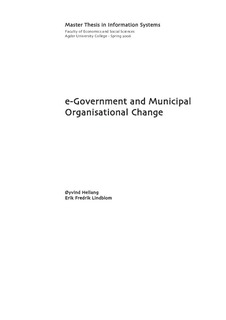e-Government and municipal organisational change
Master thesis
Permanent lenke
http://hdl.handle.net/11250/136067Utgivelsesdato
2006Metadata
Vis full innførselSamlinger
Sammendrag
Complex challenges faced by Norwegian municipality come from many sources such as balancing their role as generalist service providers with the increased call for tightening municipal budgets. Today, the municipalities also have to consider public tenders while making sure they retain enough of their core competency to give quality services to the public. When dealing with these issues, the public administration seeks solutions in the form of new organisational structures, work process re-engineering and new information systems to answer ever tougher demands from central authorities and the public. Research into the use of e-government in the area of public management has had a focus on well functional front-end portals with citizen centric evaluations and benchmarks. Technical issues regarding legacy systems and the implementation of new case processing systems with cross departmental integration is also frequented by information systems scholars. These research foci are important for effective systems, but there has also been a call for more research into the organisational effects on public administrations from e-government initiatives, and which role e-government projects can play in public organisational change. The aim of our study is to examine this angle on e-government in a Norwegian municipal context to discover the role e-government can have on the municipal back-office structure, work processes and employees. Our research questions are answered through a cross-disciplinary literary study and an interpretative case study from the Smartkom project in the North-Jæren region in Norway. The literature review encompasses both information systems research into the field of e-government and IT/organisational fit. Since this thesis focuses on the organisational aspect of e-government, we have borrowed central theories from the research fields of organisational science and public management. A comparison of the principle elements of the theories gives an overview applied to later analysis of the empirical findings. These empirical findings stem from the analysis of interviews and documents form the inter-municipal project Smartkom. This e-government development case gives insight into a local Norwegian context for the effects of e-government systems, and also shows the possibilities that can be generated in the near future from such co-operations. Our finding from the case region are discussed in light of the theories from the literature review and current Norwegian state policies. We found many issues regarding the role of e-government on current municipal change, and generated a new model that the case municipalities can implement in the near future. This model gives an alternative to the prevailing models in use today, and may solve a number of issues relating to central state and local policies. Municipal mergers related to e-government projects are also discussed, showing that e-governments is an effective tool which can be a catalyst and simultaneously used for differing interests, but it is the wielder of the tool that decides the directional outcome from the implementation of such projects. The technology in itself has no political motives, nor any inherent ideological preferences for municipal structures. Our thesis will hopefully give some fresh angles on the role of e-government and inter-municipal co-operations. New ideas for further research focus is given and practical implications for the case municipalities are given to promote the possibilities that lie within their mature co-operative efforts.
Beskrivelse
Masteroppgave i informasjonssystemer 2006 - Høgskolen i Agder, Kristiansand
Utgiver
Høgskolen i AgderAgder University College
